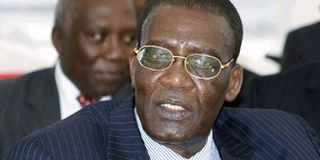Justice Omollo first up as vetting begins

Court of Appeal judge Riaga Omollo is February 23, 2012 expected to face the judges and magistrates vetting board that will determine his suitability to serve in the Judiciary. FILE
Court of Appeal judge Riaga Omollo is Thursday expected to face the judges and magistrates vetting board that will determine his suitability to serve in the Judiciary.
Justice Omollo’s past work record, including his competence and diligence, pending cases against him or recommendation for prosecution are some benchmarks to be considered as the vetting process kicks off.
Others are pending complaints against him from bodies as the Law Society of Kenya, the Anti-Corruption Agency, Advocates Complaints Commission, Police or the Judicial Service Commission, the vetting board’s chairman Sharad Rao said Wednesday.
Justice Joseph Nyamu will be next on the ‘hot seat’ in a process that will take one year where 55 judges (including those of the Court of Appeal) and 350 magistrates will be vetted.
“We guarantee that this process shall be conducted in a fair and transparent manner and shall follow all the rules of natural justice,” said Mr Rao while addressing journalist at the vetting room in Anniversary Towers, Nairobi.
“The inclusion of foreign judges is to ensure that the vetting shall be devoid of local interference as political, ethnic or otherwise and that they will be no need for apprehension among members of the public,” he said.
The foreigners are Justice Georgina Wood (former chief justice of Ghana), Justice Chomba Fredrick (from Zambia) and Justice Albeis Sachs (of South Africa) who will team up with six Kenyans.
They are Roseline Odede (vice-chairperson), Meuledi Iseme, Ngotho wa Kariuki, Justus Munyithia and Abdirashid Abdullahi.
“It is now the opportunity for the judges and magistrates to cooperate with the board during the process,” Mr Rao said flanked by the members.
He noted that no judge or magistrate had so far opted out of the process except for those due to retire.
Judges will be vetted during the first three months by the nine-member panel, before they split into groups of three members each to scrutinise the magistrates in a period of six months.
Mr Rao said that the sessions will be privately conducted unless one opts to invite the public or the media, and that information obtained during personal interviews and records of the judge or magistrate being vetted shall be confidential.
“The integrity of the members of this board and the inclusion of the foreign judges should suffice to guarantee that the process will be transparent and fair,” Mr Rao told journalists who sought clarity on the privacy of the vetting process.
Once evidence presented before the board is not found satisfactory to prove one’s suitability as a judge or magistrate of Kenya’s judiciary system, they shall be suspended or sent on leave.
The board shall, upon determining the unsuitability of a judge or magistrate to continue serving in the Judiciary, within 30 days of the determination, inform them in writing, specifying the reasons for the determination.
Once informed of the decision the judge or magistrate shall be deemed to have been removed from service, according to Judges and Magistrates Vetting Act.
The decision to remove a judge or magistrate from service shall be made public.
But a judge or magistrate who has undergone the vetting process and is dissatisfied with the determination of the board may request for a review by the same panel within seven days of being informed of the final determination.
The move to vet judges and magistrates is hinged in the Constitution as the country sought to clean up the Judiciary from corruption and other ills and enact an efficient and competent system to deliver justice for the people.
The vetting process had been opposed as Mr Dennis Mangare, a law student, sought orders to halt the exercise.
But on Tuesday, Court of Appeal judges Emmanuel O’Kubasu, Alnashir Visram and David Maraga vacated the orders and ruled that the issue is of great public interest given that Kenyans resoundingly voted for the vetting process by approving the Constitution during the referendum.
“There is legitimate public expectation that the vetting process must continue and we take judicial notice that the vetting board is ready to begin work with a set timeline. Considerable public funds have been invested into the process; we simply cannot halt its work,” ruled the judges.
Mr Rao described the ruling as very transparent and fair setting the stage for a clean-up in the Judiciary.




